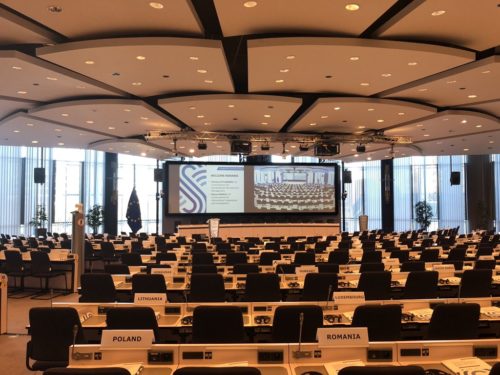
The Venezuela displacement crisis
A Shift From Regional to International in Scope
“We can’t eat there. We can’t eat here. I don’t know what to do anymore.”
As of November 2019, Response for Venezuela (R4V)—an Inter-Agency coordination platform for supporting refugees and migrants from Venezuela—estimated the number of Venezuelan migrants, refugees, and asylum-seekers at 4,626,968, with a majority fleeing to neighboring countries including Colombia, Peru, Chile, and Argentina.
The Organization of American States (OAS) projects that “Venezuelan migrants and refugees could reach between 5.3 and 5.7 million by the end of 2019 and between 7.5 and 8.2 million by the end of 2020”.
This substantial influx of migrants and refugees creates a regional humanitarian crisis and challenges for host countries, including a strain on healthcare and education systems. Refugee and migrants’ journeys are made even more difficult by a lack of access to food and clean water, vulnerability to gender-based violence, and an inability to obtain work permits in host countries.
The crises in and around Venezuela has been primarily viewed as a regional or even sub-regional issue, receiving little attention or support from international actors. This lack of global focus caused a significant gap in material support to humanitarian actors, hampered coordination between all actors involved, and yielded weak support for a political resolution to the crisis. These factors exacerbate large-scale displacement of people from Venezuela into the region.
What is driving migration from Venezuela?
The people of Venezuela continue to experience the effects of deteriorating living conditions, as economic and political turmoil drive food and fuel shortages and reduce access to clean water and essential healthcare. These issues, coupled with the crippling effects of hyperinflation and high levels of violent crime, contribute to the growing humanitarian needs inside of the country and throughout the region. The lack of access to essential services that support people’s ability to enjoy their fundamental human rights forces Venezuelans to flee into neighboring countries at alarming rates.
Crisis for Venezuelan migrants and refugees in the region
Migrants and refugees leaving Venezuela experience harrowing conditions during their journies. Venezuelans fleeing are often confronted with dangerous terrain, safety issues related to xenophobia, and exploitation, and abuse by armed groups and criminal networks.
Women and children are profoundly vulnerable to sexual and gender-based violence and exploitation, including assault, rape, transactional sex as a last resort means of securing income, and human trafficking. In a recent gender analysis report about Venezuelan migrants and refugees in Colombia, InterAction Member CARE writes, “Almost all women and girls revealed that it was common for migrants to engage in transactional sex, while adolescent girls mentioned that mothers often encouraged their daughters to do so. Humanitarian organizations reported that a high proportion of women and girls, including transgender women, are engaging in some form of transactional sex as a survival mechanism.”
Venezuelan crisis shifts into global focus
Given the dire circumstance and complexity of the crisis, the European Union hosted a Solidarity Conference in Brussels at the end of October 2019 to raise global awareness of the crises and build support for Venezuelan migrants and refugees, host countries, and NGO and assisting U.N. actors.
The Solidarity Conference convened regional host countries, donors, NGO and U.N. officials, and the broader international community to galvanize support and address the root causes within Venezuela that drive migration.

Attendees of the conference also called for donor countries and the U.N. system to provide greater funding for humanitarian aid agencies to best meet the needs of displaced Venezuelans and their host communities. In early July, The United Nations High Commissioner for Refugees and International Organization for Migration reported only receiving 23.7% of the requested funds needed to support aid efforts.
In light of the conference, over 30 humanitarian NGOs aiding in the migrant and refugee crisis submitted a joint statement, outlined recommendations for actors in the region and internationally.
The recommendations call for:
- Increased coordination between host countries.
- A broader base of international donors to commit to sustainable long-term support.
- Respect for humanitarian principles by all concerned parties.
- Socioeconomic integration for Venezuelan migrants and refugees in host countries.
- Adapting a more open data policy to promote coordination.
The Humanitarian INGO Forum in Colombia reiterated these recommendations in a floor statement at the conference and a statement released following the conference. The INGO Forum represents 20 organizations working in Colombia to support displaced Venezuelans, host communities, and internally displaced persons due to Colombia’s internal armed conflict.
The statement also highlighted a crucial issue in the humanitarian response in Colombia, as the leading host country for Venezuelan migrants. Colombia has ongoing conflicts in-country and 5 million Colombians in need. With the arrival of Venezuelan migrants, these two crises have created tension and strained resources. The INGO Forum states, “… many people arriving from Venezuela become victims of conflict, victims of forced recruitment into illegal armed groups, victims of violence, human trafficking, sexual exploitation and/or illegal economies.”
With the expected increase in Venezuelan refugees in 2020, the international community must move toward viewing the Venezuela displacement crisis as a global crisis as opposed to a regional one. More significant funding and a robust coordination effort between host countries, U.N. agencies, and NGOs must occur to support aid efforts. Effectively implementing the recommendations laid out by INGO and NNGO actors supporting displaced Venezuelans would strengthen the shift from a regional to a global response, solidifying a more stable and sustainable effort for all actors involved and—most importantly—for the Venezuelan people and their generous regional hosts.








